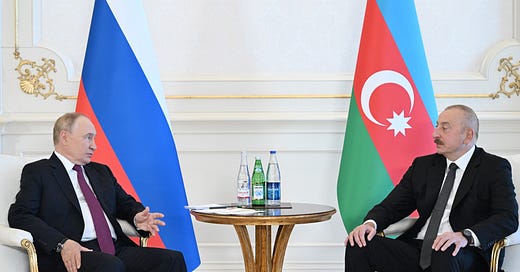Hi Everyone,
Welcome to the 20th episode of my Eyes on Eurasia Podcast! Things have been heating up in the Caspian as a new series of events has unfolded regarding Russian relations with Azerbaijan in recent weeks. Tensions between Moscow and Baku have gone off the rails since the deaths of two ethnic Azerbaijani brothers—Huseyn and Ziyaddin Safarov in the Russian city of Yekaterinburg on June 27.
To the outside world, Presidents Ilham Aliyev and Vladimir Putin have often appeared to maintain stable and neighborly relations. Some even claim that Russia and Azerbaijan were allies due to Russian backing for Azerbaijan in its recent wars with Armenia over Karabakh. Nevertheless, beneath that veneer, long-standing frictions have persisted—and now, they’ve erupted into a full-blown diplomatic crisis.
The recent unraveling in Azerbaijan-Russian relations began last year, when Russian air defenses in Chechnya struck a civilian Azerbaijani Airlines (AZAL) flight, which led to the crash of the AZAL airliner in western Kazakhstan on December 25, 2024, killing 38 of the 67 people on board, Since then, the government of Azerbaijan has repeatedly demanded an apology from Moscow and accountability from the Russian side, but no such acknowledgement has been made.
Following the deaths of the Safarov brothers, the situation escalated further: Azerbaijan detained several Russian journalists working for the Russian state outlet Sputnik, canceled high-level diplomatic visits, and accused Moscow of deliberately targeting ethnic minorities.
Behind these developments, Moscow is quite unhappy as it now senses it is losing influence in the South Caucasus to Turkey following Armenian President Pashinyan’s June 21st visit to Istanbul and meeting with Turkish President Tayip Erdogan. The Russia-Azerbaijan crisis certainly reflects a deep transformation occurring in post-Soviet geopolitics, signaling not just a bilateral breakdown but the potential unraveling of Russian influence throughout the South Caucasus.
Joining us today to discuss these recent events are Ambassador Farid Shafiyev, Chairman of the Center for Analysis of International Relations, and Ambassador Matt Bryza, former US Ambassador to Azerbaijan and a senior American diplomat with over 30 years of experience covering Russia, Azerbaijan, and the Caspian region.
Enjoy the podcast!
Glen
Speaker Bios:
Ambassador Shafiyev is Chairman of the Center of Analysis of International Relations (AIR Center) a Baku-based thinktank and a former diplomat in the Azeri Foreign Ministry who previously served as Azerbaijan’s ambassador to the Czech Republic from 2014 to 2019. In 2009, Farid Shafiyev was appointed Ambassador of Azerbaijan to Canada, where he served until July 2014. From July 2014 to February 2019, Dr. Shafiyev was the Ambassador of Azerbaijan to the Czech Republic.
Dr. Shafiyev is the author of numerous op-eds, articles and several academic publications, including “Resettling the Borderlands: State Relocations and Ethnic Conflict in the South Caucasus” by McGill-Queen’s University Press (2018). Farid Shafiyev has been lecturing in the field of International Relations and Foreign Policy in Baku. Currently, he is an Adjunct Lecturer at ADA University.
Ambassador Matthew Bryza is a former US Ambassador to Azerbaijan and a 23-year career as a U.S. diplomat that ended in 2012. Ambassador Bryza served as Deputy Assistant Secretary of State (2005-2009) and Director on the National Security Council Staff at the White House (2001-2005) for Turkey, Cyprus, Greece, Central Asia, and the South Caucasus.
From 1998 to 2001, Ambassador Bryza was the Deputy Special Advisor to the President and Secretary of State on Caspian Basin Energy Security. He also served in the U.S. Missions to Russia (1995-1997) and Poland (1989-1991).
Bryza is a frequent commentator in media outlets that have included CNN, Al Jazeera, The BBC, Fox News, Skye News, The Financial Times, Washington Post, New York Times, Wall Street Journal, Bloomberg, and Chicago Tribune, as well as numerous outlets in Turkey and the South Caucasus.












Share this post